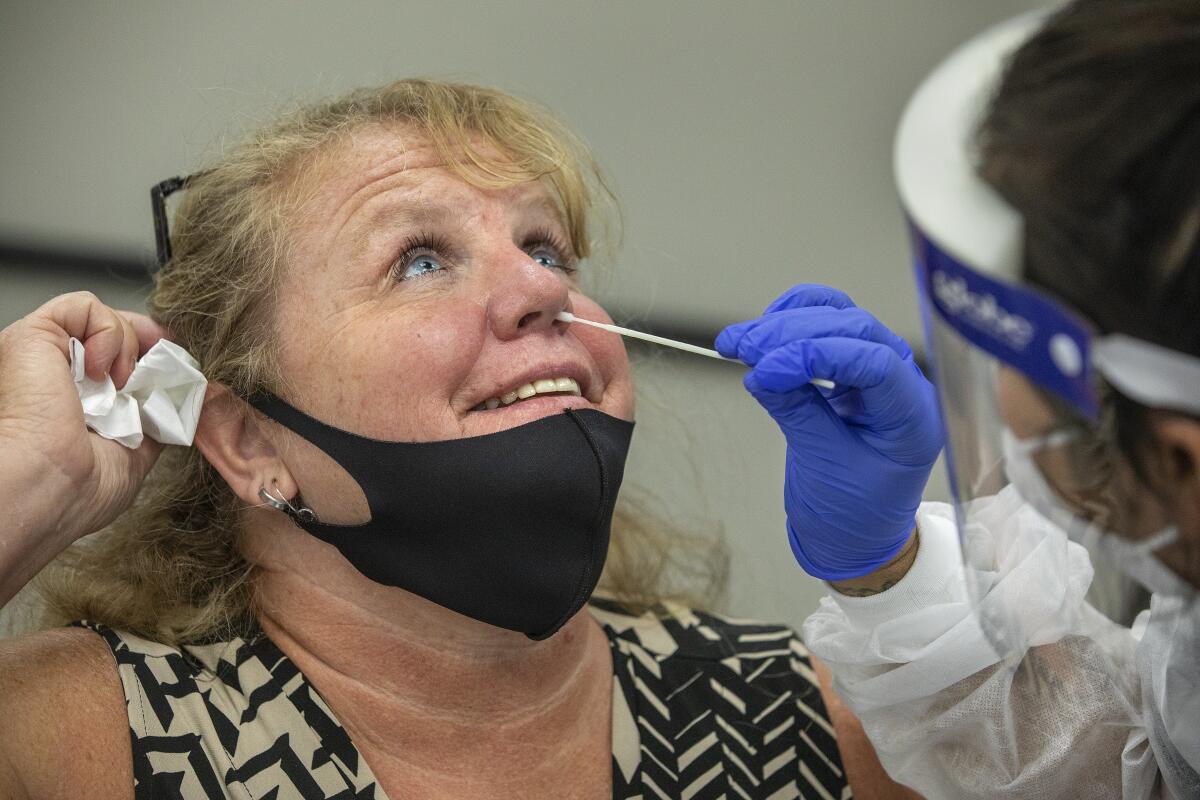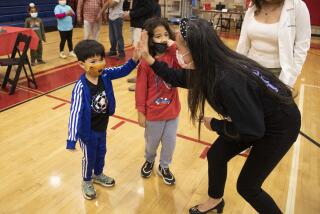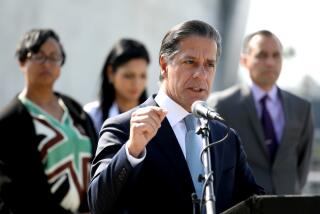Despite calls for help, school districts fend for themselves on campus coronavirus tests

Lennox School District Supt. Scott Price has dealt with academic programs, union negotiations and budget deficits. But nothing has prepared him or other education leaders to make decisions about a pressing medical issue: How to — or even whether to — provide school-based coronavirus testing to students, teachers and other staff.
Many experts view regular, universal testing at schools as a crucial component to helping campuses reopen and remain open, while also contributing toward curbing the raging pandemic. Yet California does not require school-based testing and no one has offered to pay for it. So, Price is going to take a pass — with some misgivings — and try to keep his staff and 5,000 students safe through other means when they are able to return to campus.
“In a small school district, we don’t have the resources or expertise with which we could implement a comprehensive testing program,” Price said.
Price’s dilemma — and his decision — appear to be the default for many school systems across Los Angeles County and beyond. Frustrations over closed schools continue to increase and were expressed in early November in a letter to Gov. Gavin Newsom from leaders of seven of the state’s largest school systems. They called for the testing of all students and staff, uniform testing guidelines, and the resources to pay for it — but have not yet received a response, said Los Angeles schools Supt. Austin Beutner.
Assemblyman Patrick O’Donnell (D-Long Beach) said the state needs to provide more leadership and clarity, including on testing — a conclusion several other legislators have echoed.
The governor’s office and the state health department did not respond Thursday to a request for comment, but officials have moved incrementally toward clarifying the situation as the pandemic stretches into its 10th month, with millions of students unable to learn on campus since March.
One such step is a task force charged with developing guidelines for school testing and how to increase it, said Daniel Thigpen, a spokesman for the state Department of Education, which is a member of the task force. And several school districts will be participating in a state-funded pilot involving the state’s new testing lab in Valencia.
In the meantime — depending on a county’s coronavirus rates and local decisions — schools districts have remained closed, have reopened or have partially reopened without the data and assurances that proactive testing, typically called surveillance testing, has the potential to provide.
When it comes to coronavirus testing there is no consensus on what’s best. At one end are experts who call for testing virtually the entire nation twice a week so that people with the virus can enter quarantine and avoid spreading COVID-19. Others shudder at the cost and logistics of that approach.
Members of President-elect Joe Biden’s incoming administration have advocated for expanded nationwide testing. Biden has also called for rapidly reopening schools, but it isn’t clear what role testing would play.
In the fall, colleges in the Northeast partnered with the Broad Institute in Massachusetts to test students once or twice a week and avoided large, sustained outbreaks — in direct contrast to colleges elsewhere that lacked such a program.
Some experts say K-12 schools can rely on safety protocols that don’t include costly surveillance testing. They point to schools that appear to be successful with fidelity to masking, social distancing, hygiene and keeping students in small, separate groups. There’s also disagreement over how much surveillance testing is adequate, a debate that has played out in New York City.
Backers of extensive proactive testing include Beutner, who says it has the potential to prevent or minimize outbreaks at a school, keeping more people safe and preventing frequent academic disruptions resulting from classroom quarantines and even campus shutdowns.
Price has been tracking the high number of cases and deaths in the Lennox area, a low-income community near Los Angeles International Airport that is heavily populated with essential workers. Cases have especially exploded in the last few weeks.
His district’s health resources are thin — a few health clerks and one school nurse shared by eight schools.
“It would be very difficult to have our community and staff feel confident enough for any type of campus-based learning at this time,” Price said. “It’s an emotional issue, and people are scared.”
Both L.A. Unified and San Diego Unified, the state’s largest and second-largest school systems, have crafted their own surveillance testing. San Diego is scheduled to launch a pilot Monday.
L.A.’s more ambitious effort envisioned one to three tests per person per week along with contact tracing and school-by-school release of testing data. But because of the pandemic, L.A. County schools have only partially reopened. L.A. Unified has been especially cautious; less than 1% had returned for in-person services before Beutner ordered a new, temporary shutdown this week.
Through Dec. 5, L.A. Unified said it had used 201,545 tests. According to the contract schedule, the district was supposed to have used about 1.4 million tests by this point. Regardless, L.A. Unified is obligated to pay in full for a $48.9 million testing contract that runs through June.
The district hasn’t necessarily spent unwisely — the tests are reportedly good for three years and could be resold — and widespread availability of a vaccine could be many months away. Beutner said the district is in discussions over extending the contract to account for the slower rollout. But it’s possible that the district won’t be reimbursed for its costs by other government agencies because it has moved forward on its own. Beutner has estimated the full cost of the testing program, which includes personnel and software costs, at $150 million.
“As far as I know, we’re the only school district doing what we’re doing because it’s hard,” Beutner said. “I believe it will stand the test of time.”
Other school systems are simply relying on city and county testing that is free to them, but typically intended only for people who are feeling sick or who have been possibly exposed to someone who tested positive. Whether that’s enough to protect schools is difficult to know because of inconsistent and incomplete data collection and disclosure about schools that have reopened.
On a cost-per-test basis, L.A. Unified inked what still looks like an exceptionally good deal with SummerBio, a start-up in Menlo Park. Prices start at $20 a test and drop to $10 after 2 million tests. According to the company and L.A. Unified, the low price is a result of volume purchasing and automated processing.
Across the nation, other innovations are being refined, including home tests that provide immediate results. But it may prove difficult to make fast and deep cost reductions because expenses also include field staff, software engineers and customer service, said Agatha Bacelar, general manager for California of Curative, another start-up. It had 12 employees when she joined in March and now employs about 2,600 — and continues to hire.
Curative is providing tests that are free to those who stop by at sites across L.A. The city pays Curative for those not covered by insurance or federal CARES Act funding, said Haley Albert, the company’s director of growth in California.
Camino Nuevo Charter Academy, which operates seven charter schools and an early education center, has partnered with Curative to provide free tests to all who want them in a campus parking lot. Because of privacy restrictions under this setup, the school network has no access to testing information that could assist in its planning.
Curative also provided tests free of charge for about 60 Camino Nuevo staff members on two occasions — Curative can send the bill elsewhere because teachers are considered essential workers. But the price for students would be about $115 a test, which is comparable to what others are charging. The charter network has about 3,500 students and 550 employees.
Camino Nuevo turned down an opportunity to buy into L.A. Unified’s testing program for an estimated $250 for each student and staff member. School leaders concluded that price tag to be unaffordable. They are still trying to chart the best path forward.
“We know that testing is going to be the thing that helps slow the spread,” said Adriana Abich, Camino Nuevo’s chief executive.
More to Read
Sign up for Essential California
The most important California stories and recommendations in your inbox every morning.
You may occasionally receive promotional content from the Los Angeles Times.











